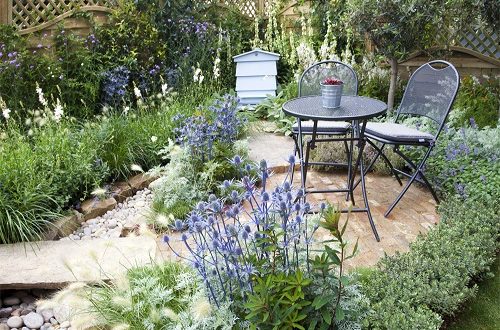Spending time in the garden is linked to similar benefits for health and wellbeing as living in wealthy areas, according to a new large-scale study.
Research conducted by the University of Exeter and the Royal Horticultural Society charity, published in Elsevier’s Landscape and Urban Planning, analysed data from nearly 8,000 people collected by Natural England between 2009 and 2016. The research, conducted with funding from Innovate UK and NIHR, found that people who spend time in the garden are significantly more likely to report general good health, higher psychological wellbeing and greater physical activity levels than those who do not spend time in the garden.
The study found the benefits of gardening to health and wellbeing were similar to the difference in health between people living in the wealthiest parts of the country, compared to the poorest. The benefits applied whether people spent their time gardening or simply relaxing. People who regularly spend time in their garden were also more likely to visit nature elsewhere once a week.
The study also found that people with access to a private garden had higher psychological wellbeing and those with an outdoor space such as a yard were more likely to meet physical activity guidelines. These benefits were in comparison to people who did not have a garden or outdoor space.
Dr Sian de Bell, of the University of Exeter Medical School, lead author of the study, said: “A growing body of evidence points to the health and wellbeing benefits of access to green or coastal spaces. Our study is one of the largest to date to look at the benefits of gardens and gardening specifically. Our findings suggest that whilst being able to access an outdoor space such as a garden or yard is important, using that space is what really leads to benefits for health and wellbeing.”
Dr Becca Lovell, also of the University of Exeter Medical School and project lead, said: “Gardens are a crucial way for people to access and experience the natural environment. Our new evidence highlights that gardens may have a role as a public health resource and that we need to ensure that their benefit is available equally.”
Prof Alistair Griffiths, Director of Science and Collections at the Royal Horticultural Society and co-author on the paper, said: “This work adds to the increasing body of scientific evidence on the health benefits of gardens and gardening. As the current COVID crisis has demonstrated, there’s an urgent need to include the provision of private gardens in the planning process to better support the UK’s preventative health agenda and the wellbeing of our nation.”
There is growing evidence that living in a greener neighbourhood can be good for health and wellbeing, but most research has focused on public green spaces such as parks and playing fields. The current research used data collected by Natural England’s Monitor of Engagement with the Natural Environment Survey, the world’s largest survey collecting data on people’s weekly contact with the natural world.
The study is entitled ‘Spending time in the garden is positively associated with health and wellbeing: Results from a national survey in England’. The work was undertaken as part of the University of Exeter’s collaborative partnership with the Royal Horticultural Society on wellbeing and gardening. The study was supported by Innovate and the National Institute for Health Research Health Protection Research Unit (NIHR HPRU) in Environmental Change and Health at the London School of Hygiene and Tropical Medicine, in partnership with Public Health England (PHE), and in collaboration with University College London and the Met Office.
 Gardeners Club The Gardeners Club is a free to join online club for everyone with an interest in gardening and gardens.
Gardeners Club The Gardeners Club is a free to join online club for everyone with an interest in gardening and gardens.






